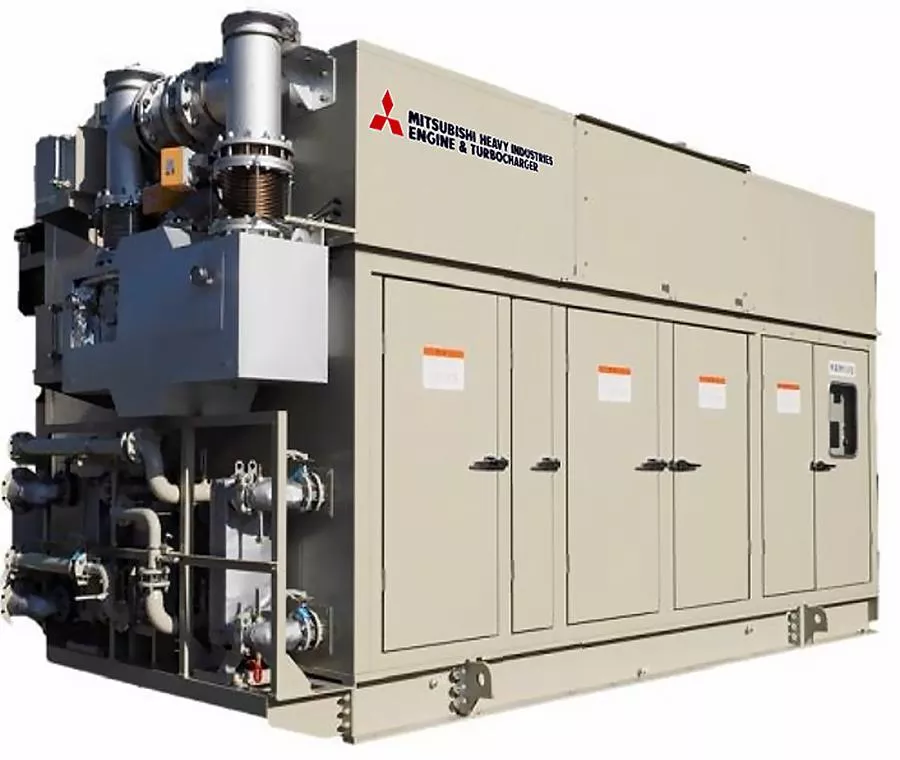- Jointly developed with Toho Gas, based on the currently available 450kW city gas engine GS6R2
- Allows for hydrogen co-firing rate of up to 15 vol%, with maximum output and operation unchanged even during hydrogen co-firing operation
- Package also available to run solely on city gas at the time of installation, while allowing for switch to hydrogen co-firing with minimal on-site modifications

"SGP M450" 450kW gas cogeneration system
TOKYO, July 4, 2025 - (JCN Newswire) - Mitsubishi Heavy Industries Engine & Turbocharger, Ltd. (MHIET), a part of Mitsubishi Heavy Industries (MHI) Group, announces a new lineup to SGP M450, a gas cogeneration system jointly developed with Toho Gas Co., Ltd., capable of hydrogen co-firing at a maximum of 15 vol%, with power output of 450kW. It is launched for Japan market at present.
To allow for hydrogen co-firing, the two companies modified the fuel gas and engine control systems of the GS6R2 city gas mono-firing engine to develop a hydrogen co-firing engine. More than 500 hours of demonstration testing was conducted at the Toho Gas Technology Research Institute (Tokai, Aichi Prefecture), confirming the reliability of hydrogen mixing and the reduction in CO2 emissions.
In the demonstration testing, various simulated operating patterns were applied to verify capabilities required for power generation equipment to respond to fluctuations in power demand and maintain stable operation. The tests confirmed that there is no risk of abnormal combustion, and that the system can be operated in the same manner as the city gas mono-firing model.
The hydrogen blend ratio has been set at a maximum of 15 vol% to minimize the scope of change from conventional natural gas engines. The system has two operating modes, city gas 13A mono-firing mode and hydrogen co-firing mode, and can be switched between modes at any point during loaded operation. In hydrogen co-firing mode, only city gas is used for starting the engine, which means the same amount of initial load as city gas mono-firing mode can be accepted even in the event of a power outage, making the system highly reliable for business continuity plans (BCP).
In addition, for customers who are considering the use of hydrogen in the future, MHIET is also offering the "Hydrogen Ready" package. The system is configured for city gas mono-firing at the time of installation, but some equipment and functions necessary for hydrogen co-firing are also pre-incorporated, allowing for a shortened work period when the site is converted for hydrogen co-firing.
Cogeneration systems, owing to the expected reduction in the environmental load through energy conservation, are considered one of the distributed energy resources that should be pursued further to achieve carbon neutrality. Moreover, since they are power sources able to respond to power outages resulting from large-scale disasters or other emergencies, they are also expected to play a role in strengthening resilience.*Going forward, MHIET will continue to promote the greater use of hydrogen and the widespread adoption of distributed power generation, contributing to the realization of a low-carbon and decarbonized world, and improving the resilience of society as a whole.
(*)Resilience denotes toughness, recuperative power, and flexibility. It specifically refers to such initiatives as development of disaster-resilient infrastructure, expanding cooperation with businesses to support quick recovery, and strengthening information dissemination.
About MHI Group
Mitsubishi Heavy Industries (MHI) Group is one of the world’s leading industrial groups, spanning energy, smart infrastructure, industrial machinery, aerospace and defense. MHI Group combines cutting-edge technology with deep experience to deliver innovative, integrated solutions that help to realize a carbon neutral world, improve the quality of life and ensure a safer world. For more information, please visit www.mhi.com or follow our insights and stories on spectra.mhi.com